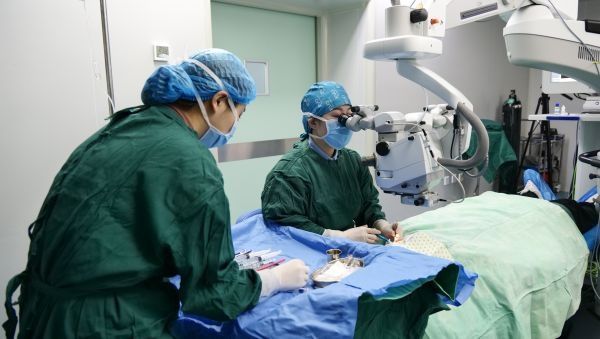Yangtze River Daily Wuhan Client, February 27th (Reporter Wu Ye, Correspondent Gu Junfang, Wu Xuqing) The “post-90s” boy could not carry out laser myopia surgery due to thin cornea, on the morning of February 27th , the expert team precisely implanted a contact lens into his eye to help the patient restore high-definition vision.

A group photo of Mr. Xia (left) and Dr. Guan Nian after the operation. Photo by Correspondent Gu Junfang and Wu Xuqing
30-year-old Mr. Xia lives in Wuchang, with 325 degrees of myopia in his left eye and 375 degrees of myopia in his right eye. The thick spectacles confine him, who loves sports.
On February 14, Mr. Xia came to Wuhan Purui Eye Hospital, determined to remove his glasses through laser myopia surgery. Unexpectedly, a piece of inspection report that the cornea was thin made him fall into an ice cave – the thickness of the cornea of normal people’s eyes is between 500-550 microns, while the thickness of Mr. Xia’s cornea is only 482 microns, which is not suitable for laser myopia surgery.
“The reason people get myopia is because the front and rear axis of the eye becomes longer, and the light cannot be focused on the retina.” Guan Nian, director of the refractive and myopia surgery department of Wuhan Purui Eye Hospital, introduced that laser myopia surgery is performed by Cuts the corneal tissue in such a way that it changes the refractive index of the light and brings the focus back to the retina. However, this surgical method has certain limitations and is not suitable for patients with thin corneas or large degrees of myopia.
Different from the “subtraction” of laser myopia surgery, the ICL lens implantation is “addition”, which involves implanting an implantable contact lens into the eye. Compared with laser myopia surgery, its biggest advantage is that it does not need to cut corneal tissue, and it is the preferred correction method for patients with high myopia or poor corneal conditions.

The doctor performed precise ICL implantation for Mr. Xia. Photo by Correspondent Gu Junfang and Wu Xuqing
Mr. Xia rekindled his confidence when he learned that “taking off the mirror” was promising. After more than 20 detailed preoperative examinations, Mr. Xia waited to check the qualified good news. On the morning of February 27, Director Guan Nian successfully performed precise ICL lens implantation for the patient with the help of intraoperative OCT navigation microscope. After the operation, although he was still recovering, Mr. Xia was pleasantly surprised to find that he could see the surrounding things clearly.
[Editor: Yu Lina]